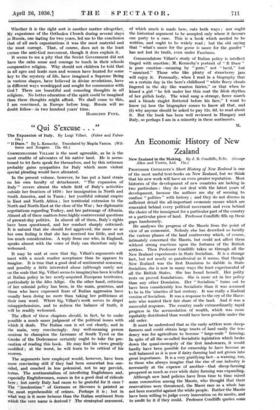" Qui S'excuse . . .
The Expansion of Italy. By Luigi Villari. (Faber and Fabei-
15s.)
" Il Duce." By L. Kemechy. Translated by Magda Vamos. (Wil- llama and Norgate. 12s. 6d.) COMMENDATORE VILLARI is the most agreeable, as he is the most erudite of advocates of his native land. He is accus- tomed to let facts speak for themselves, and by this reticence probably gains sympathies for Italy which more violent special pleading would have alienated.
In the present volume, however, he has put a hard strain on his own faculty of detachment. "The expansion "of Italy " covers almost the whole field of Italy's activities outside her frontiers of 1870: her immigration in North and South America, and in Tunis ; her youthful colonial empire in East and North Africa ; her territorial extension to the North and North-East at the close of the War ; her diplomatic negotiations regarding Turkey, and her patronage of Albania. Almost all of these matters form highly controversial questions of present-day politics. In almost all of them, Italy's rights have been questioned, and her conduct sharply criticized. It is natural that she should feel aggrieved, the more so as her own feeling is that she has received too little, and not too much consideration. A reply from one who, in England, speaks almost with the voice of Italy can therefore only be welcomed.
It may be said at once that Sig. Villari's arguments will meet with a much readier acceptance than he appears to imagine. It is true that a good deal of sentimental nonsense, and possibly a little interested abuse (although surely not on the scale that Sig. Villari seemsto imagine)has been levelled at Italian policy in her newly-acquired European territories, particularly in the Alto Adige. On the other hand, criticism of her colonial policy has been, in the main, generous, and those who have expressed fears of Italian aggression have usually been doing no more than taking her politicians at their own word. VVhere Sig. Villari's work serves to dispel misapprehensions, and to redress the balance of truth, it will be readily welcomed.
The effect of these chapters should, in fact, be to make possible a much saner judgment of the political issues with which it deals. The Italian case is set out clearly, and in the main, very convincingly. Any well-meaning person anxious to champion the Germans of South Tyrol or the Greeks of the Dodecanese certainly ought to take the pre- caution of reading this book. He may find his views greatly modified ; at the worst, he will learn to be critical of his sources.
The arguments here employed would, however, have been more convincing still if they had been somewhat less one- sided, and couched in less polemical, not to say peevish, terms. The sentimentalism of interfering Englishmen and, especially Englishwomen, comes in for a good deal of ridicule here ; but surely Italy had cause to be grateful for it once ? The " irredentism" of Germans or Slovenes is painted as the most reprehensible of crimes. Perhaps it is ; but in what way is it more heinous than the Italian sentiment from which the very name is derived ? The strategical arsument. of which much is made here, cuts both ways ; nor ought the historical argument to be accepted only where it favours one party to a case. This is a book which needed to be written, and ought to be widely read ; but the old saying that " what's sauce for the goose is sauce for the gander " has not lost its truth, even under Fascismo.
Cominendatore Villari's study of Italian policy is intellect tinged with emotion ; M. Kemechy's portrait of " Il Duce " is pure emotion—meaning by " pure," not " lucid," but " unmixed." Those who like plenty of strawberry jam will enjoy it. Personally, when I read in a biography that on a certain day in the hero's childhood " white fleecy clouds lingered in the sky like wanton fairies," or that when he kissed a girl " he felt under her thin coat the fresh rhythm of her girlish body. The wind sang a- strange, fierce march and a blonde ringlet fluttered before his face," I want to know (a) how the biographer comes to know all that, and (6) why anyone should be asked to pay 12s. 6d. to read about it. But the book has been well reviewed in Hungary and Italy, so perhaps I am in a minority in these sentiments.
M.




































 Previous page
Previous page